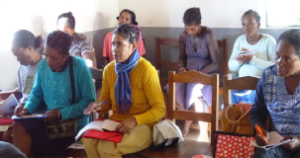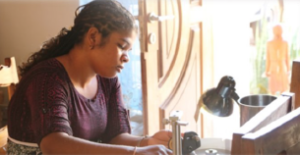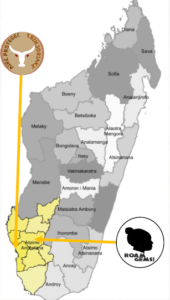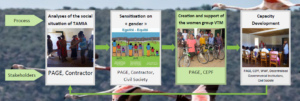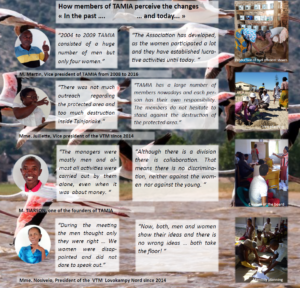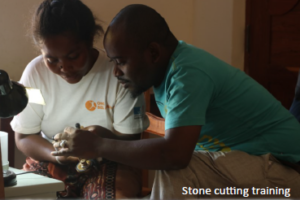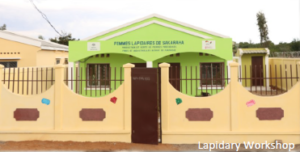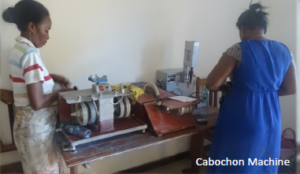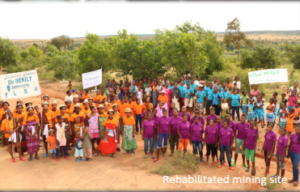Supported by PAGE, the Environmental Project of GIZ Madagascar
The environment, forestry and renewable energy
sector are at the centre of the bilateral cooperation
between Germany and Madagascar.
The Programme d’Appui à la Gestion de l’Environnement (PAGE) is a support programme for the Ministry of the Environment, Ecology and Sustainable Development. It was launched in 2015 to contribute to the implementation of the country’s
commitments and priorities at international and national level on sustainable environmental management.
The overall objective of the Programme is the improvement of the sustainable and climate-resilient use and protection of
natural resources in and around protected areas.
PAGE works in four regions of Madagascar:
Atsimo Andrefana, Diana, Boeny and Analamanga.
In Atsimo –Andrefana, the project is implemented
through five components:
Component 1: Conservation and sustainable use of natural resources that will boost incomes
Component 2: Expansion and professionali-sation of the biomass energy value chain
Component 3: Political, institutional and legal frameworks
Component 4: Integration of environ-mental and social sustainability aspects into small-scale mining
Component 5: Climate Change Adaptation
Following the slogan « Vision needs Attitude, Attitude meets Actions », the teams of the components 1 and 4 of PAGE Atsimo Andrefa-na have turned the theory of gender equality into action:
C1 of PAGE supports the first model in Madagascar for a community managed Protected Area: Tsinjoriake. The 5484 ha of forests and mangroves are taken on by the association TAMIA, representing nine communities with today more than 750 members, about 75 % women. However, TAMIA started with only men on the board and as ironic as it might sound: To improve collaboration between men and women, a separate women group (VTM) was established in 2014. It now provides the women their own space for discussion, decision making and development. Want to know more? Read on!
C4 of PAGE supports the Artisanal and Small scale Mining (ASM) sec-tor. According to official statistics, Madagascar provides an estimated 40% of the global market of sapphires. The sapphires often come from artisanal mines, causing dev-astating environmental destruction. At the same time, the dream of the big treasure never comes true for most of the small scale miners, but leaves them in poor living conditions. Most painfully affected are eventually women and children of the ASM communities. Thus, a pro-gramm was initiated to enhance women with lapidary and related skills to enhance their autonomy.
Association TAMIA – Managers of the Protected Area Tsinjoriake
Men and Women – Stronger together
Empowering marginalised Women to become professional lapidaries
– enhancing Women‘s Autonomy to build stronger Communities
Despite the high value of the targeted resource, the sapphire, overall there has been no positive impact on the livelihoods of the rural communities surrounding the artisanal mines. Whilst the rural small scale miners are trying to make a survival from day to day, the environmental impact of their activities is one of their last concerns. Trees are cleared, dangerous holes are dug in the ground and rivers are used as sand cleansing area without a sustainable concept.
Most vulnerable in these unstable living conditions are the women and children of the mining communities.
However, sapphire exploitation also provides gemstones with considerably fewer value. Small-scale miners often throw these away. Consequently, the idea was born to enhance especially the livelihoods of the mar-ginalized women through valorization of the mining by-products:
In 2016, 30 women were trained on basic costume jewellery production. 15 women were selected from this group to undertake training on cabochon production and advanced costume jewellery. After multi-criteria ranking, four of those women were trained on cutting colored and precious stones.
PAGE is supporting a women’s lapidary center to use low value stones to make jewellery. The workshop was inaugurated in June 2018. Training is provided to women based on their ambition, availability and basic education. Until October 2019, they have produced 3 450 different types of jewellery.
As an empowerment measures, PAGE provided training on:
• French language,
• entrepreneurship culture,
• community life,
• simple accounting,
• basic computer skills,
• health-safety-environment.
PAGE has donated improved mining materials and protection gear for the small scale miners and their affiliates. The « trommel », for example, facilitate the work, enhances the safety of the miners and minimise the pressure on the envi-ronment, as the sand is no longer washed out in the river.
Further support is provided through rehabilitation of mining sites and afforestation.
In the long run it is expected that the income from alternative products also has a positive impact on the environment.
Challenges
Among the majority of the associations’ members the comprehension level is rather low. It takes time and repetition to accept innovations. Consequently, it takes even longer to change the entire society around them with their social structures and communication styles that have marginalize the rural women since generations. So, how can we maintain the positive gender dynamics in the communities beyond our project?
The women were supported with technical advice, material and financial support to initiate revenue generating activities (production of jewellery for C4, food processing and fuel efficient stove production for C1) to eventually achieve financial autonomy (usually the domain of men). However, the life span of our projects is too short to establish a stable market and assure their future.
We can observe a positive change within the association. But did life in general change for the members of the associations? And how can we measure the courage, which the women gained to speak out in public ?
The devastating poverty situation leads to egocentric behavior due to a matter of survival. Some individuals try to undermine all efforts for personal gain and jeopardize the communal development.
Lack of frequent exchange with other projects as the Regional Gender Network (outside GIZ!) is not active
Best Practices
Step by step approach that includes plenty of visualization, presentation of case studies, anec-dotes and sharing of experiences to respond to the different comprehension levels and to facilitate inspiration
Gain of trust by the associations’ members and functioning as catalyst and accelerator through constant participatory consultation, motivation and mediation
Application of endurance, creativity and mutual respect as well as collegial consultation to thoroughly understand the social situation and interdependence of men and women as well as young and old to finally find collaboratively solutions
Routine of frequent meetings to provided a framework for sharing of information, discus-sions and situation analysis as well as planning and review of activities
Reinforce the members’ capacities and jointly develop strategies to improve their communication and decision-making structure to avoid conflicts and achieve transparency
Systematic integration of quantitative and quali-tative gender balance in each activity, assuring not only equal presence, but also participation of each gender and the communication flow between them
Welcoming intern and extern cooperation and take on the plaidoyer and direct discussion with other stakeholders, who share the same vision of gender equality, for the expansion and continuity of our efforts
Next Steps
Reinforcement of collaboration with other stakeholders for continuation of capacity building and financial support
Research on methods how to formally measure qualitative impact of gender development
An active regional forum for information exchange on gender equality

 GIZ Gender Website
GIZ Gender Website